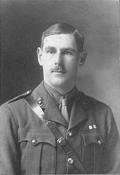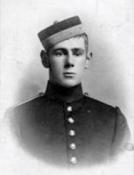
|
The King's School Canterbury |
Roll of Honour |
| Major Harold Graham PARIS MC and Bar | |
|
138th Heavy Battery, Royal Garrison Artillery Date of birth: 13th October 1887 Date of death: 6th October 1918 Killed in action aged 30 Buried at Hargicourt British Cemetery Plot I Row J Grave 1 |

|
| He was born in Southampton on the 13th of October 1887, the youngest son of Alexander Paris, solicitor and notary public, and Emma (nee Kemp) of 'Beeton House', Milton, near Southampton. He was educated at the King's School Canterbury from September 1901 to July 1905, during which time he played in the Cricket XI in 1905. He acted as trainbearer at the enthronement of Archbishop Davidson in 1903. In July 1905 he passed 21st in the examinations for the Royal Military Academy Woolwich from where he was commissioned as a 2nd Lieutenant in the Royal Garrison Artillery on the 23rd of July 1907. He was then sent for further training at the School of Gunnery at Shoeburyness. He was promoted to Lieutenant on the 23rd of July 1910 and was posted to 88th Battery Royal Garrison Artillery based at Victoria Barracks in Hong Kong. He was stationed there until 1913. On the 19th of August 1914 he proceeded to France with the 35th Heavy Battery and took part in the retreat from Mons, the Battle of the Marne, the Battle of the Aisne and the First Battle of Ypres. He was promoted to Captain in November 1914 and was mentioned in General French's despatches of the 31st of May 1915. He returned to England where he acted as an instructor for a time at Woolwich until July 1915 when he was posted to the newly formed 138th Heavy Battery, Royal Garrison Artillery as Officer Commanding. He relinquished command of the battery in March 1916 to Major A. Mitchell and stayed as second in command. He was mentioned in General Haig's despatches of the 13th of November 1916 and on the 16th of November he took temporary command of 200th Siege Battery, returning to the 138th to take command from Major Mitchell on the 20th of December 1916. He was promoted to Acting Major on the 21st of January 1917 and on the same day was posted as Officer Commanding the 144th Heavy Battery. On the 20th of February he returned and took command of the 138th once again. He was awarded the Military Cross in July 1917 an award which appeared in the London Gazette of the 16th of August. The citation read:- "For conspicuous gallantry and devotion to duty in keeping his men in action under very heavy hostile shell fire, during which he worked at a gun himself, setting a splendid example to his men. A few days later he most skillfully withdrew his guns under a heavy bombardment, and he has on many previous occasions displayed great courage and fine leadership." He was awarded a bar to his medal for action in June 1918 which appeared in the London Gazette of the 13th of September 1918 and read:- "For conspicuous gallantry and devotion to duty. This officer superintended the withdrawal of his guns under heavy fire, and largely owing to his efforts only one gun had to be abandoned. Earlier the same day he remained in the observation post, sending back information when his telephonists were severely wounded. Throughout the fighting he commanded his battery with skill and cheerfulness, keeping his men in good spirits." He was killed at Estrees on the 6th of October 1918 and was buried the following day. His death was witnessed by Gunner F. Edgecumbe and he wrote the following in a letter to Major Paris' family:- "About twenty to four the first shell came on to the battery. Several Hun planes flew overhead and directed the fire by dropping red lights, all the time machine-gunning. We did not move from the bivouacs as the shelling was direct on the battery which was some 300 yards away. After about ten minutes the 'planes evidently spotted our bivouacs and, I should imagine, took them for ammunition dumps. There was a sudden burst of fire round the bivvies, and for about five minutes hell raged. The shells were chiefly "77's" and 4.2 gas. We laid flat and only hoped. "A shell burst just outside our home and a fragment wounded Gunner Ward (Mr. Greenhough's man) in the heel. He screamed out, and I got him into a chair and ripped off his boot. He shouted for the Major, who was half asleep in his bivvy, for the fiercest bombardment was a matter of indifference to him. He came in and pacified Ward, whose heel I had dressed. "The Major was in front of Ward, when Billingham (Lt. Annesley's man), who was watching me replace Ward's boot, was hit in the head. He rolled over screaming, and the Major immediately tore his own field dressing out and began to dress the wound. To make space I took Ward into the officers' bivouac and laid him on his back, so that he was comparatively safe, being below the ground level. The shelling was continuous. "A 4.2 gas shell burst behind the kitchen and again wounded Billingham in the leg. The Major came to the door of the kitchen, and I rose to go to him. He said, "A field dressing, Edgecumbe," and came towards me. As I was handing it to him a shell burst behind or sideways, I don't know which. "He was struck by a piece, staggered towards me, and I caught him in my arms. His own weight carried both myself and him to the entrance of the Mess, I staggered backwards under his weight, and he collapsed in a sitting position on the ground, I supporting him. I tore open his collar, and saw the wound just below the right collar bone, the piece having passed through both lungs and out at his left side. He uttered no word, for his lungs were full. As I placed the pad upon the wound the blood stopped welling, and he had passed away. "The whole affair took no longer than two minutes from beginning to end. When I saw he had gone the whole world went dark to me, and I shouted out for help. Gunner Butcher shouted for help, and Corporal Norton and Bombardier Elliot rushed up, after them came Lieutenant Greenhough, he looked at the Major, gave one hopeless gesture, and said, "He has gone, we can do nothing." Billingham was wounded for the third time, and Lieutenant Greenhough and the others, with Dawkins, who could not leave Billingham, took him and Ward to the dressing station. There was a slight lull in the shelling for about ten minutes, I composed the Major, and covered him as best I could. The shelling recommenced, and I was alone there. I took a chance and ran to the cookhouse for company. Sergeant Taylor was killed about the same time. "Lieutenants Greenhough and Annesley came around and cleared us all into the cellars of a ruined farm about 200 yards on the flank. There we took shelter for the night. The next day I took the Major's possessions from his pocket, and we wrapped him in two blankets, a soldier's shroud. In the afternoon (again we were shelled). We carried his body to a motor lorry, which conveyed all that remained of the two bravest and most gallant men in France to the Hargicourt Quarry Military Cemetery. A grave had been prepared by his own men, and there we buried them, side by side, two brave souls. "The while a great 9.2 Railway gun, a few yards off, fired, as it seemed, a parting salute. A trumpeter sounded the Last Post, and we looked our last upon him we admired and loved beyond all men. The Colonel and Staff and several brother Majors paid their last respects at the grave, and so we left them in a soldier's grave, laying as they would have wished to lay, buried by the loving hands of men who loved them as truly as a man can love. "We shall never forget him." He was married in the summer of 1915 to Helen Margery (nee Payne) of Hillmorton, Parkstone, Dorset. He is commemorated on the Southampton Cenotaph and on the war memorial at Highfield. |
|
 | |
Back